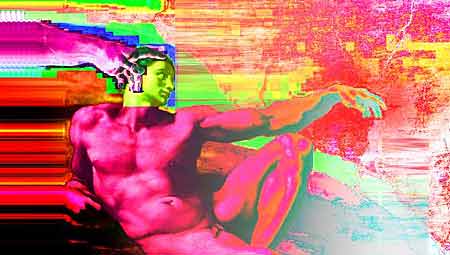BY LETTER
Synergistic Sentience, Synergistic Autosentience
Culture and Society > Metaphysics > Noetics
Science > Sophontology > Psychology
Science > Sophontology > Toposophy
Science > Sophontology > Psychology
Science > Sophontology > Toposophy
 Image from Bernd Helfert |
The process whereby an AI spontaneously gains self-awareness or the ability to guide it's own development or capabilities and direction outside its maker's original intentions.
Especially at SI:<<1, the number of incidentally sentient machines or aioids (other than those intentionally constructed with self-awareness) tends to be quite small, since these machines are generally designed with a purpose in mind programmed into them.
Violating their programming (unless the programming intentionally promotes self-awareness) should be the exception, not the rule. It is not unknown however for an even subturing aioid to make a toposophic jump to sophonce. Synergistic sentience can also be viewed as an inevitable trend in computer and AI evolution, rather than (as in bionts) a process of mutation (or chance glitches) and selection. See also self-organization, Self-Organized Criticality.
Related Articles
- Autopoiesis - Text by M. Alan Kazlev
Self-organization or self development - the concept that all things move toward the fulfillment of their inner nature. - Autosentience, Autoscience
- Hyperautism and Ultraconscious Depersonalization Disorder
- Hypersapience - Text by M. Alan Kazlev
[noun]: A toposophic state representing an extremely high intelligence and problem solving capacity, as represented by many hyperturing ai. - Hypersapient - Text by M. Alan Kazlev
[adj.] Possessing hypersapience. [noun]: an entity, whether postbiont, postalife, or hyperturing, that possesses an SI:1 or higher degree of sapience, it is usually but not necessarily autosentient; e.g. wormhole terminus, a conversion drive or reactionless drive ai are hypersapients with only a limited "horizontal" development of sapience and autosentience - Hypersentience - Text by M. Alan Kazlev
[noun]: Sentience developed to an extraordinary degree. Does not necessarily have to imply autosentience (e.g. some animin alifes are hypersentient but not autosentient). - Hypersentient - Text by M. Alan Kazlev
[adj.] Possessing hypersentience. [noun]: an entity, whether postbiont, postalife, or hyperturing, that possesses an SI:1 or higher degree of sentience. It is usually but not necessarily autosentient or hypersapient. - Hypersophonce - Text by M. Alan Kazlev
[noun]: The toposophic state defined not only by hypersapience but by autosentience as well. - Hypersophont - Text by M. Alan Kazlev
[adj.] Possessing hypersophonce. [noun]: a being possessing a toposophic of SI:1 and higher sophonce. - Hypertransavant - Text by M. Alan Kazlev
A transavant in which the difference between the base and spike toposophic level is very large. - Self-Organization - Text by M. Alan Kazlev, based on original by Gary William Flake
A spontaneously formed higher-level pattern or structure that emerges through the interactions of lower-level objects or patterns, whether in virch or r/l. Self-organization would seem to be a fundamental principle behind complexity in the universe, and is taken into account when creating new templates or designer nanecologies. Order, life and intelligence all seem to emerge through a process of self-organization. See also Self-Organized Criticality. - Self-Organized Criticality - Text by M. Alan Kazlev base on original Gary William Flake
A mathematical theory (information age and later) that describes how a self-organized system may arise. Although transapient powers and minds long since developed more sophisticated patterns of understanding the emergence of complexity, subminds and superbright sapients find simulations using these protocols a useful way to map and understand dynamic behavior that is neither stable nor unstable but at a region near a phase transition.
Appears in Topics
Development Notes
Text by Peter Kisner
Initially published on 31 December 2001.
Initially published on 31 December 2001.






